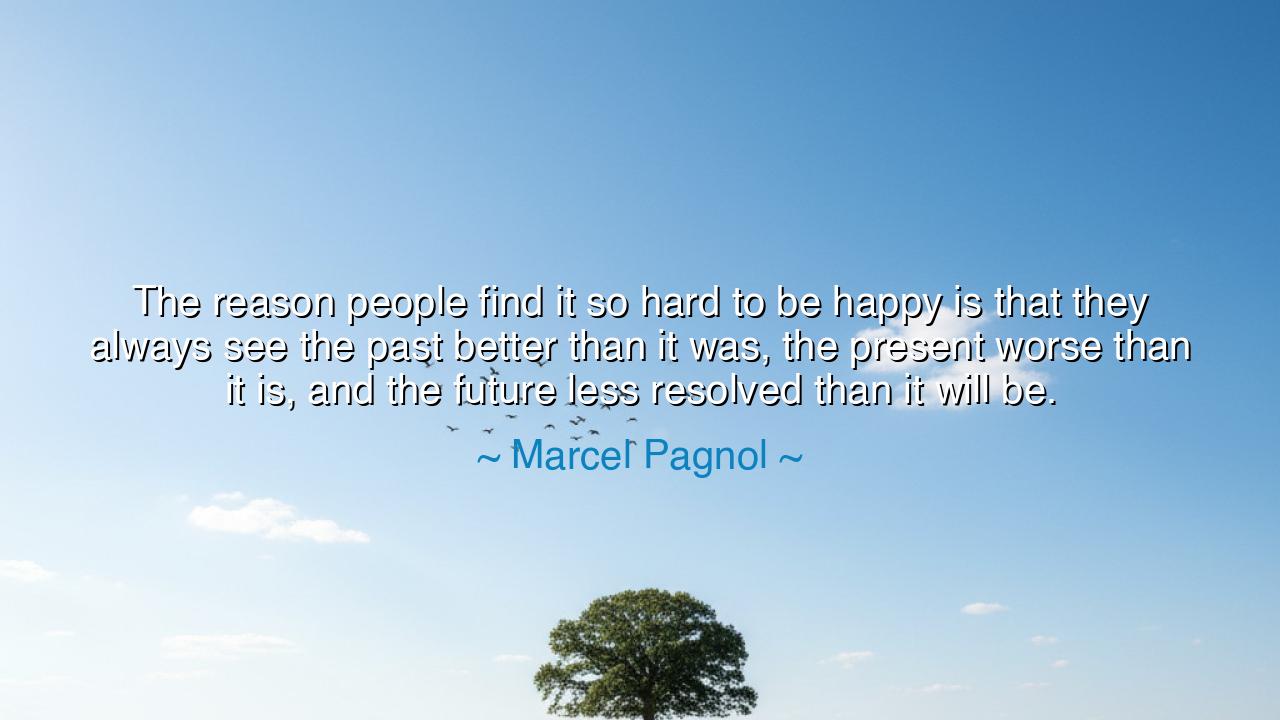
The reason people find it so hard to be happy is that they always
The reason people find it so hard to be happy is that they always see the past better than it was, the present worse than it is, and the future less resolved than it will be.






In the complex journey of life, few things are as elusive as true happiness. Marcel Pagnol captured this with striking clarity when he said, "The reason people find it so hard to be happy is that they always see the past better than it was, the present worse than it is, and the future less resolved than it will be." These words speak to a fundamental truth of the human condition—that we are often prisoners of our own perception, trapped between an idealized past, a troubled present, and an uncertain future. We long for happiness, but we cloud our vision with nostalgia, discontent, and fear.
The ancients recognized this tendency in human nature, understanding that our minds are often too quick to compare and contrast the different moments of life. Plato, in his work on the nature of the soul, spoke of the power of memory and anticipation, arguing that both the past and the future are colored by our emotions and thoughts. The past often appears brighter because it is filtered through the lens of our current desires and disappointments. What seemed mundane or even painful in the moment is often remembered with fondness, as if time itself had softened the edges of the experience. The present, by contrast, is clouded by our frustrations and the constant yearning for something better, making it appear far worse than it truly is.
This timeless human pattern can be seen in the lives of the great warriors of history. Take the example of Alexander the Great, whose conquests were filled with triumph, yet marred by internal strife and struggles for peace after his victories. In the later years of his life, as he faced the challenges of ruling such a vast empire, he often looked back on the early days of his campaigns with longing, remembering them as more glorious than they had truly been. The future, always uncertain, seemed like an endless expanse of obstacles, yet Alexander’s early dreams of unity and empire-building were filled with hope, a hope that grew more difficult to maintain in the face of present challenges.
Consider also the story of Julius Caesar, who, in his final years, reflected on the past triumphs of his military campaigns. As he walked the streets of Rome, he was haunted by memories of glory and the immense promise of his rise, but was deeply aware of the difficulties he faced in consolidating power. The present felt fraught with danger, as tensions rose within the Senate and among his own allies. Caesar, despite his extraordinary successes, felt isolated and weighed down by the burdens of his empire. The future, with all its uncertainty and conflict, seemed less resolved than it ultimately would be, for his legacy would endure far beyond his death, shaping the course of history in ways he could not fully foresee.
The lesson in Pagnol’s words is that we are often caught in the trap of comparison—comparing the past, present, and future in ways that hinder our ability to truly embrace happiness. By romanticizing the past, we fail to appreciate the beauty of the present moment. By focusing on the flaws of today, we miss the many blessings that surround us. And by fearing an uncertain future, we rob ourselves of the opportunity to act with courage and hope. This imbalance creates a cycle of discontent, making it nearly impossible to find peace and fulfillment in the present.
In our own lives, we must strive to break free from this cycle. We must learn to appreciate the present moment for what it is, not what we wish it to be. Rather than longing for the past, we should honor it by carrying its lessons forward. Instead of fearing the future, we must embrace it with faith in our ability to face it with wisdom and courage. It is in the balance of these moments—the present, the past, and the future—that true happiness lies. To live in a way that fosters contentment is not to ignore the challenges of life but to meet them with the clarity of mind that comes from being fully present in each moment.
Thus, the true wisdom of Pagnol’s words is this: happiness is not a distant dream, nor is it something that will come when we finally achieve perfection or solve all of life’s problems. It is found in the art of embracing the present, of accepting the reality of what is, and of acting with courage and conviction in the face of what is yet to come. True happiness is not a matter of wishing for a better past or fearing a worse future, but of living fully in the moment, recognizing that the only time we truly have is now.






AAdministratorAdministrator
Welcome, honored guests. Please leave a comment, we will respond soon